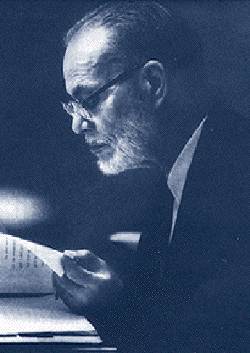 By Yasser Latif Hamdani
By Yasser Latif Hamdani
Last week (February 6) marked the 114th Birthday of one of Pakistan’s greatest unsung heroes. Once again, there was no mention of commemoration of his remarkable like. No sense of gratitude from a nation for which he did so much. He has been wiped out of our memory because he was an Ahmadi, despite his glorious contributions to Pakistan and its cause (see related post on Dr. Abdul Salam).
Sir Zafrullah Khan’s services rendered to Muslims of India, Pakistan and the Third World are second only to that of Quaid-e-Azam Mahomed Ali Jinnah. As a jurist, a diplomat and a patriot he stood head and shoulders above the lesser men who have made a mockery of our republic.
Born in 1893 in Sialkot in what was to become one of the earliest Ahmaddiya households, this small town boy rose to be one of the shrewdest legal minds of his time. His early education was in Sialkot, after which he proceeded to Lahore for his bachelors degree, under the tutelage of none other than the great Iqbal himself. He got his law degree from King’s College London in 1914, where he stood top of his class and was the first person from the Indian subcontinent to do so. He was, like most great figures of that time, called to bar at Lincoln’s Inn.
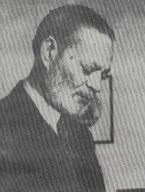
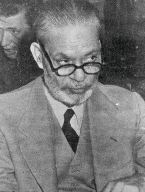
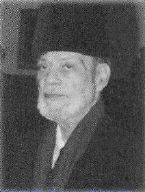


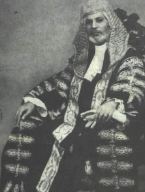
As a practicing lawyer, he soon proved his mettle and had many reported cases to his name. The first major politician to recognize Zafrullah’s talents was Sir Fazli Hussain, the founder of Unionist Party of Punjab. Starting his career in his early 30s as a member of the Punjab legislative Council, he rose to prominence as an indefatigable crusader for Muslims of Punjab. Later he represented the Muslims at round table conference and crossed swords with figures like Jinnah and Gandhi. In 1931, he became the Muslim League president and at the roundtable conference, he cornered no less a person than Churchill in a committee hearing who was forced to accept Zafrullah’s point of view.
Later he was offered a seat on Viceroy’s permanent Council, which he took to further his cause. He also served at varying times as the minister of Railways, Public works, labour and law under the Viceroy. For a brief period, he also became British India’s representative to the League of Nations, just before it was dissolved.
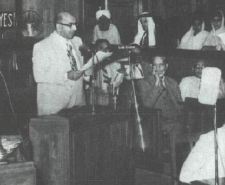
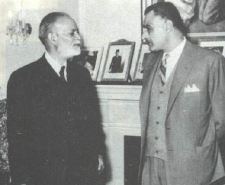
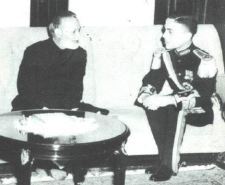
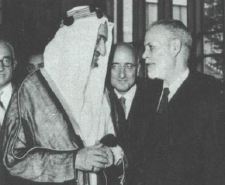
![]()
However his greatest contribution came when he drafted the famous Lahore Resolution, which till this day is the rallying point of Pakistan and Pakistani nationalism. He had been tasked with finding a common point between the popular demand for “Pakistan” and Muslim League’s all India requirements. The Lahore resolution was a broad based solution which left the door virtually open for several solutions and negotiation on the issue of partition. In essence it envisaged 2 or 3 great republics for the Muslim peoples and it was this document which forms the basis not just of Pakistan but also of Bangladesh. For this he got a lot of slack. No less a person than Khan Abdul Wali Khan highlighted Zafrullah’s religious belief to play on the popular conspiracy theory that holds Ahmadis to be British touts.
Later from 1942 onwards, he served as a federal judge (equivalent of an Supreme court C judge) of India and finally took leave on the eve of Pakistan to serve the cause of Pakistan before the Radcliffe Commission, on Jinnah’s personal request. On 25th December 1947, Jinnah appointed him the Foreign Minister of Pakistan. At the UN, Sir Zafrullah emerged as the most eloquent advocate of all third world and Islamic issues. It was Zafrullah whose efforts materialized into the UN Resolutions on Kashmir, which are the basis of the Pakistani case and grievance. Later he became the first Asian president of the International Court of Justice, a singular and unique honor for any Pakistani. He also served, briefly, as the President of the UN General Assembly. He passed away in September of 1983 in Lahore.
A prolific author on the history of Pakistan and Islam, his most famous book was titled “Agony of Pakistan” in which he makes plain the great betrayal which wrested the country from the hands of its patriots into the hands of those who were its greatest enemies. Ironically, today Jinnah’s most trusted lieutenant is not even remembered by the state which owes him so much, including its own founding document. It is the memory of people like Zafrullah Khan that will keep alive the original idea of Pakistan and there is no doubt that one day the posterity will reclaim its true destiny as a progressive and modern republic.
Yasser Latif Hamdani is a lawyer in Lahore and a researcher of the history of the Pakistan Movement.




















































A brief life sketch
PART I – Pre-Independence
• Born on February 6, 1893, in Sialkot.
• Acquired primary education at the American Mission School, Sialkot.
• Graduated from the Government College, Lahore, in 1911.
• Went to England in August, 1911 and remained there uptil November, 1914. During this period he studied at Kings’ College, London, and was called to the Bar having studied at Lincoln’s Inn. During this period Chaudhry Sahib also had the occasion to visit various places in England, Switzerland and Germany.
• Practised as a lawyer in Sialkot, during the period January 1915 to July 1916.
• Practised in Lahore during the period August 1916 to 1935.
• Served as a lecturer in the Law College, Lahore, during the period 1919 to 1924.
• Was elected a member of the Punjab Legislative Council in 1926.
• In 1927, acted successfully as representative counsel for the Muslims of the Punjab in the contempt of court case against the ‘Muslim Outlook’.
• Presided at the Delhi Meeting of the All India Muslim League in 1931 and advocated the cause of the Indian Muslims through his presidential address.
• Participated in the Round Table Conferences (Gol Maiz Conferences) held in the years 1930, 1931, and 1932.
• Visited Chicago for the first time and participated in the World Faith Congress held in the year 1933.
• Remained a member of the Executive Council of the Viceroy of India, during the years 1935 to 1941.
• Became the Minister of Railways in May, 1935.
• On May 16, 1938, the mother of Sir Zafarullah Khan died.
• Wrote a book ‘Meri Walda’ (My Mother) in the year 1938.
• In 1939, represented India in the League of Nations.
• In 1941, delivered a speech on the topic “Foundation for a New World” which was broadcasted on All India Radio.
• Was appointed Judge of the Federal Court of India in September 1941, which post he held until June 1947.
• Was appointed the Agent General of India in China in the year 1942.
• In 1945, represented India as the Indian Government’s nominee in the Commonwealth Relations Conference, where courageously spoke for the cause of India’s freedom.
• At the request of the Quaid-e-Azam, represented the Muslim League in July 1947 before Radcliffe Boundary Commission and presented the case of the Muslims in highly commendable manner.
• Was the Advisor on Constitutional and Legal Affairs to H.H. the Nawab of Bhopal, from June to December 1947.
I welcome the statement of ATP Administrator,and the same time i will request and hope that they will not give the space to such topics which create conterversy among people of pakistan,and also allow people to promote religion activities.
Brother Ahsan i already wrote if you think this democracy is according the teachings of islam then its ok,think and decide.May ALLAH protect pakistan and all of you.
You missed one, Jew loving.
[quote comment=”34187″]Ahsan first its not my personl religious interpretation,i said only this word(khuda)not mention in QURAN.(Its all to call him with his beautiful name from many,as we do also in our lifes to call our children)2end jomhuriyat is also not mention in holy QURAN,remember brother islam is not about words but teachings,if you think democracy is according teachings of islam,then its ok if not then not acceptable.if we do then it will mean to share with law of ALLAH,whitch call as “CHERAK”(sharing with ALLAH or with ALLAH’s law)and this is the bigest sin in islam and not forgivable by ALLAH.i tryed explain in short i hope you have got it.May ALLAH propect pakistan and all of you.[/quote]
Wheenever we talk of democracy, it is demos/kratia which stands for State (of, by and for) the people. People stands for all citizens of the state. Also, in a democracy, for the sate affair the people is sovereign. This is the definition which has been accepted by the major part of the states and countries in the world. If the word jamhooriyat is equal to democracy, then this jamhooriyat is not mentioned in the Holy Book.
The democracy as defined above is alien to Islam and it will be a great SIN to mix this democracy with Islam as you explained.
If you change the definition of democracy to some kind of Islamic Democracy with a ‘one man rule’ and applying Quranic laws then the system of the government will be Islamic and not democratic. Should we call it laa-jamhooriyat?
Ahsan
[quote comment=”33890″]Dear Rai,
May Allah Protect Pakistan, Islam, Pakistanis and Muslims from people like you. Amen.[/quote]
“Summa Ameen”